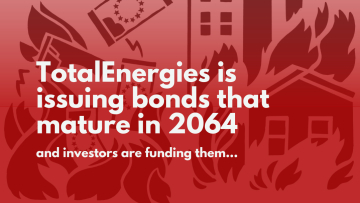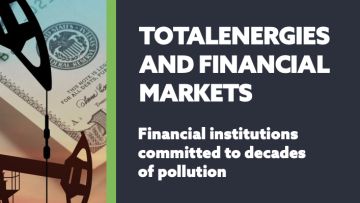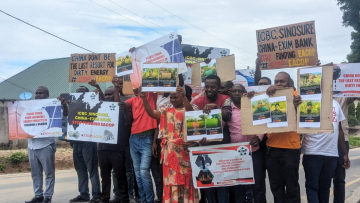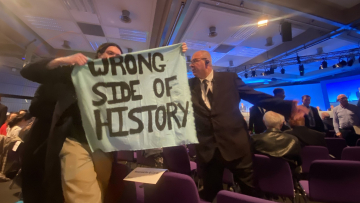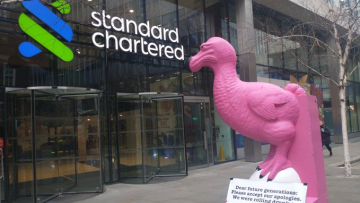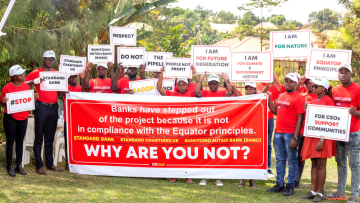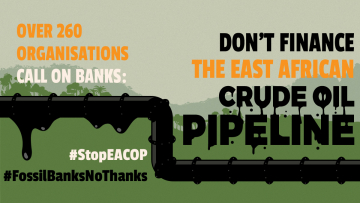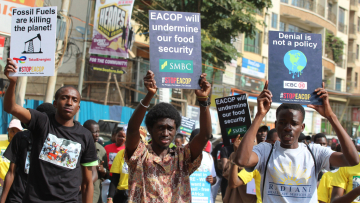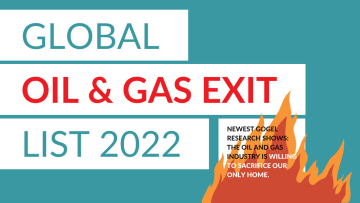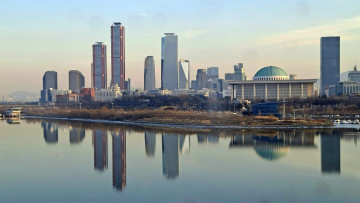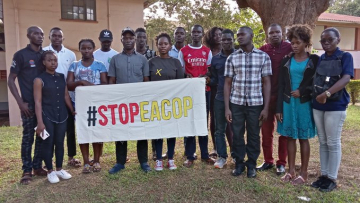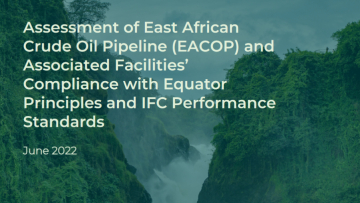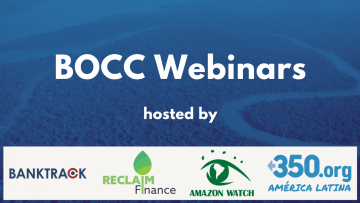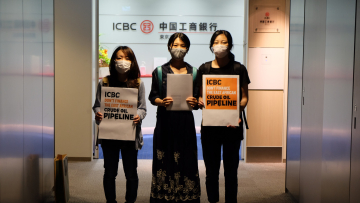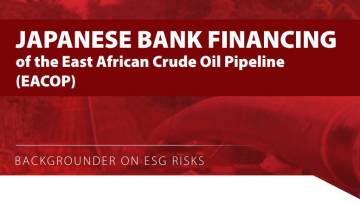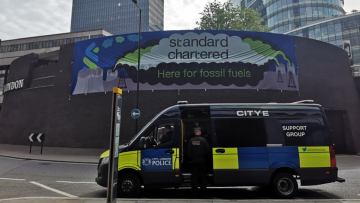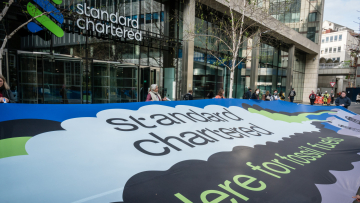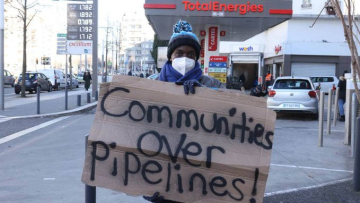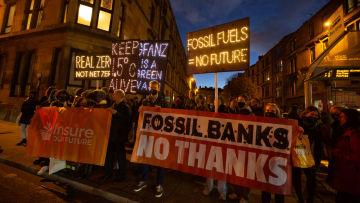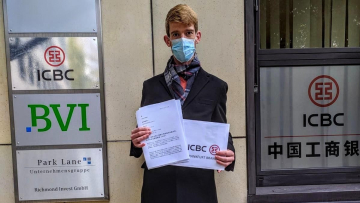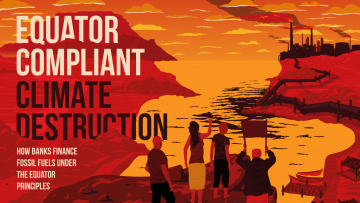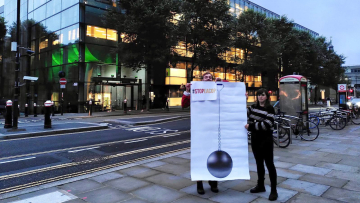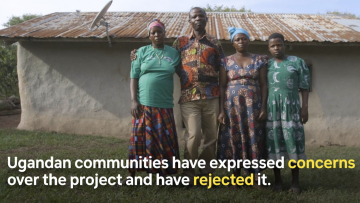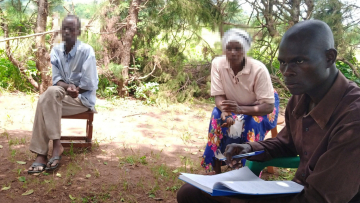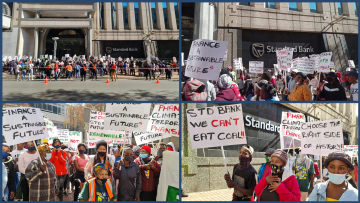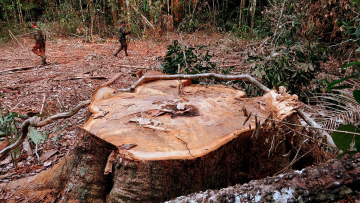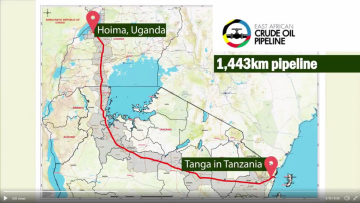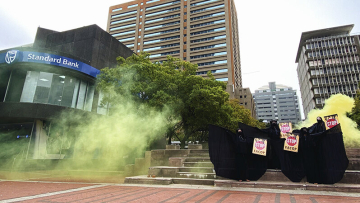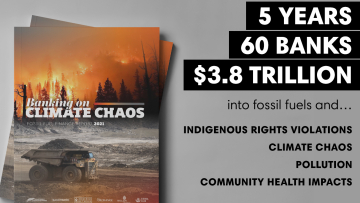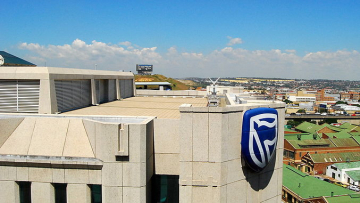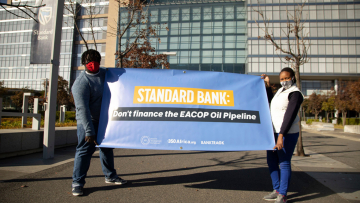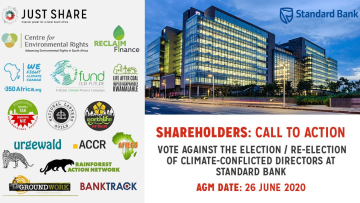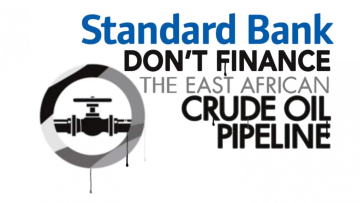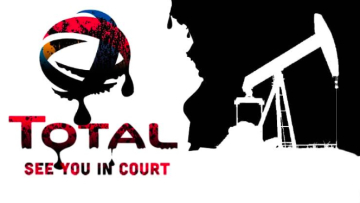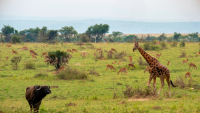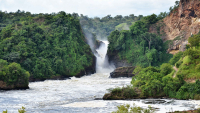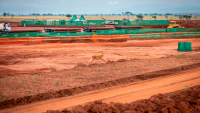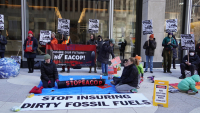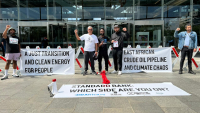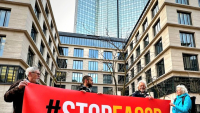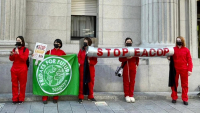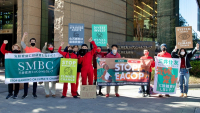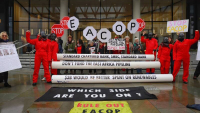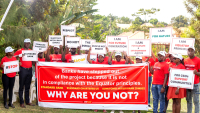
Project – Target
This profile is a priority campaign targetBankTrack, 350.org Africa, AFIEGO & Inclusive Development International
Henrieke Butijn: henrieke@banktrack.org

Project – Target
This profile is a priority campaign targetBankTrack, 350.org Africa, AFIEGO & Inclusive Development International
Henrieke Butijn: henrieke@banktrack.org
Why this profile?
The East African Crude Oil Pipeline (EACOP) is a 1,443-kilometer pipeline which is under construction between Hoima, Uganda and the port of Tanga in Tanzania. Construction is enabling the opening up of critical ecosystems including Murchison Falls National Park to oil extraction. In addition, it has caused large-scale displacement of communities and pose grave risks to protected environments, water sources and wetlands in both Uganda and Tanzania.
What must happen
This project presents unacceptable risks to local people through physical displacement and threats to incomes and livelihoods; unacceptable risks to water, biodiversity and natural habits; as well as representing a new source of carbon emissions the planet can ill afford. As such, banks should avoid financing this project and instead seek opportunities to finance genuine renewable infrastructure to help meet the region’s energy needs in a clean and rights-compatible manner in the decades to come.
| Take Action! |
| Tell banks not to finance the East African Crude Oil Pipeline: www.StopEACOP.net |
| Sectors | Pipeline Transportation of Crude Oil |
| Location |
|
| Status |
Planning
Design
Agreement
Construction
Operation
Closure
Decommission
|
| Website | http://eacop.com/ |
|
|
This project has been identified as an Equator Project |
The East African Crude Oil Pipeline (EACOP) is a 1,443-kilometer oil pipeline that is under construction between Hoima, Uganda and the port of Tanga in Tanzania. EACOP Ltd plans for the pipeline to be operational in 2026.
Approximately 1.7 billion barrels of recoverable oil have been discovered in the Albertine Graben, the basin of Lake Albert, on the border between Uganda and the Democratic Republic of the Congo. Extraction will take place at two oil fields: the Kingfisher field, operated by China National Offshore Oil Corporation Ltd (CNOOC Ltd), and the Tilenga field, operated by TotalEnergies.
Once extracted, a small proportion of the oil will be refined in Uganda, but most of it will be exported to the international market via the EACOP. If completed, it will be the longest heated pipeline in the world.
Both the extraction sites and the EACOP pose serious environmental and social risks to protected wildlife areas, water sources and communities throughout Uganda and Tanzania. As such, the project is facing significant local community and civil society resistance.
See BankTrack's EACOP Finance Risk briefing papers for more information:
- Finance Risk Briefing, November 2020
- Finance Risk Update, August 2021
- Finance Risk Update No. 2, January 2022
- Finance Risk Update No. 3, June 2022
- Finance Risk Update No. 4, April 2023
- Finance Risk Update No.5, February 2024
- Finance Risk Update No. 6, October 2025
Impact on human rights and communities
Large scale land acquisition and resettlement: FoE France calculates 13,000 households will lose land due to the project. Resettlement Action Plans show 86,000 people will be affected by the EACOP, and 32,000 by the Tilenga oil project (FoE France/Survie report 2022). The compensation process has seen delays, irregularities, insufficient information and harassment. For community testimonies, see HRW (2023), Afiego (2024).
Delayed and unjust compensation: Many people were ordered to stop growing perennial food and cash crops on land needed for the project, several years before receiving any compensation. Some had to give up on agriculture (Oxfam 2020 p.59). Over 75% of respondents to a 2023 AFIEGO study experienced delayed, inadequate or unfair compensation, and almost all could not acquire land equivalent to that lost. Many faced reduced crop productivity and income, leading to indebtedness and lost access to education. Some households accepted the insufficient compensation, while more than 100 have been sued by the government for refusing it.
Threats to human rights defenders and journalists: In May 2025 UN Special Rapporteur Michel Forst called out TotalEnergies’ “continued failure to ensure protection” of environmental defenders, calling for its immediate action to protect EACOP activists and others. This followed a long track record of civil society members and journalists being intimidated, repressed, and arrested for speaking up about the project – 70 cases are compiled at eacopmap.org. Most recently, in April 2025, 11 activists were arrested after asking to present a letter to KCB Bank, which had financed the project. They are still in detention pending trial.
Impacts on livelihoods: Oil extraction is already impacting fisherfolk in Lake Albert, including through displacement, low compensation and pollution, while some 460km of the pipeline’s route lies within the basin of Lake Victoria, Africa’s largest lake, which directly supports the livelihoods of over 40 million people.
The pipeline risks degrading or polluting the many rivers and watercourses it crosses. Rather than using industry best practice, Total and its partners have chosen the lowest cost option, open cut trenching, for almost all crossings. Construction of the Central Processing Facility in 2023 and the feeder pipeline in 2024 already disrupted the drainage system in Buliisa, resulting in unprecedented frequent floods that submerged crops, leaving families without food.
The pipeline also threatens tourism in Uganda and Tanzania, with Murchison Falls National Park being a major tourist destination. The 5,000 jobs promised by the project (almost all temporary) are far outweighed by potential tourism job losses. According to Oxfam (2020) and FIDH (2020), local people had limited information on employment opportunities and some were denied employment in the initial stages of the project.
Gender aspects: Oil extraction disproportionately affects women, who are burdened by relocation and social changes while being excluded from employment and compensation. These issues are explored in recent reports including by Multinationals Observatory and WOGEM (both 2025). Growing prostitution is hindering the efforts of HIV/AIDS workers (ActionAid, 2023). Oxfam’s gender analysis (2019) showed income losses when women lose land and men control benefits and compensation.
Impacts on cultural rights, including for Indigenous Peoples: Affected people fear the loss or destruction of spiritually important land and structures, such as sacred sites, graves, and cemeteries, and cultural ways of life that are linked to agriculture, fishing, and hunting. Oxfam identified the Barbaig, Sandawe, Ndorobo, Maasai, Akie and Taturu as Indigenous tribes that are especially vulnerable to the EACOP project’s impacts.
Video: EACOP's gender toll. By Women for Green Economy Movement Uganda
With support from @350Africa under @11thhourproject we documented the #VoicesOfWomen on how #EACOP has impacted their #Livelihoods. The pipeline has caused #Despair #Sadness #Trauma . Women are calling for #Justice from @TotalEnergies @CNOOCUgandaLtd #COP30 pic.twitter.com/QQp8Ly8O3F
— Women for Green Economy Movement Uganda (@WogemU) November 26, 2025
Impact on climate
A 2022 study by the Climate Accountability Institute (CAI) finds the total emissions attributed to the 25-year operation of the pipeline total 379 million tonnes CO2 (MtCO2). At peak pipeline crude oil flow, in years three through six, emissions total 34.8 MtCO2/yr. This sum is significantly greater than the combined emissions of Uganda and Tanzania, at a time when the world’s scientists are telling us that new fossil fuel developments need to stop if we are to tackle the climate crisis.
The EACOP ESIAs estimate only the carbon dioxide emissions from the pipeline’s construction and operation. However, the CAI study shows this is a mere 1.8% of total, with far larger emissions from maritime transport, refining the oil into petroleum products, and from the use of the fuels by their end-consumers.
Further, these emissions assume that the EACOP will only be used for transporting oil from the Kingfisher and Tilenga oil fields. However, the EACOP could also be used for other oil fields in Uganda, DR Congo, Tanzania or even South Sudan, potentially extending its lifespan and increasing the emissions that it will enable. DR Congo is in discussions with Uganda over the use of the pipeline. According to the Africa Report, TotalEnergies representatives have met with Congolese officials to show interest in developing oil blocks. Transporting the extracted oil through EACOP could add up to 50,000 barrels per day to the 216,000 barrels per day from the Tilenga and Kingfisher sites.
Impact on nature and environment
Biodiversity, wildlife and protected nature areas: The ecologist Bill McKibben has said that EACOP’s proposed route "appears almost intentionally planned to threaten the highest number of animals possible." The EACOP facilitates oil extraction in Murchison Falls National Park, which threatens biodiversity and rare and endangered species, and is already impacting wildlife including elephants. TotalEnergies’ plan for the Tilenga oil field includes 10 well pads within the boundaries of the national park, each connected to several wells and amounting to some 130 oil wells. By 2024, 47 oil wells had been completed, including some in the park.
Important tributaries of the Nile flow nearby. Communities expressed concerns that possible river pollution risks an increase in cross-border conflicts as distant as North Africa.
Nearly 2,000km2 of protected wildlife habitats will be impacted. A feeder pipeline for the EACOP begins in the Tilenga oil field, partly situated in Murchison Falls National Park. Another feeder pipeline will encroach on the vulnerable Bugoma Forest Reserve, home to large groups of Eastern Chimpanzees.
From Hoima, EACOP runs through and will destroy swathes of the Taala Forest Reserve, a large savanna reserve and an important biodiversity conservation site. The potential loss of forest cover from construction is particularly problematic as Uganda is already losing about 90,000 hectares of forest per year.
In Tanzania, the pipeline will run through the Biharamulo Game Reserve, an IUCN Category IV site, and Wembere Steppe Key Biodiversity Area. Biharamulo Game Reserve hosts animals including lions, buffalo, impalas, hippos, giraffes and the red colobus monkey. The Wembere Steppe is an important place for seasonal birds. Some 500km2 of wildlife corridors for the Eastern Chimpanzee and African Elephant are likely to be severely degraded.
Finally, when reaching the Tanzanian shore, two important Ecologically or Biologically Significant Marine Areas (EBSAs), Pemba-Shimoni-Kisite and Tanga Coelacanth, are at high risk from the huge amount of oil to be transferred offshore at the Tanga Port. These EBSAs host several Marine Protected Areas (MPAs) as well as Mangrove Forest Reserves, and coral reefs and waters with dugongs and sea turtles. Pemba Island is also an Alliance for Zero Extinction site.
Ramsar Wetlands: The project will directly impact several Ramsar Wetlands of International Importance. Oil extraction will take place within the Murchison Falls-Albert Delta Wetland System, a Ramsar site and a spawning ground for indigenous fish species. The pipeline will run near or through a number of Ramsar sites just west of Lake Victoria, including Mabamba Bay, the Lake Mburo-Nakivali System, the Lake Nabugabo System, the Nabajjuzi System, and the Sango Bay-Musambwa Island (see EACOP Threat Map in the Maps section of this profile).
Pollution and waste: The probability of a pipeline oil spill is high, with around a third of the pipeline located in the Lake Victoria watershed, an active seismic area. There are already several accounts of oil spills or seepages in the Albertine Graben region, including one at the Kiboro hot springs on March 29, 2020.
Regular cleaning of the pipeline will generate hazardous waste containing benzene, a human carcinogen. This waste will have to be either incinerated, which can generate hazardous air pollution, or be disposed of in storage sites at each pumping station, meaning each pumping station would become a hazardous-waste disposal site.
Water sources: The pipeline poses high risks of freshwater pollution and degradation, particularly to the Lake Victoria basin. Constructing and testing the pipeline requires a significant amount of water. The Tanzanian ESIA states several batches of around 16,000 m3 of water will be needed for testing, although the pipeline will traverse several water-stressed regions, further threatening water availability.
Impact on pandemics
Emergence of new infectious diseases. The EACOP project also threatens to cause infectious outbreaks. Hundreds of scientific studies have shown a link between biodiversity destruction and the emergence of infectious diseases.
Murchison Falls National Park, being in the tropical part of Uganda, is not only home to animal and plant diversity but also viruses, bacteria and parasites. Destruction of sensitive areas such as forests along the EACOP route creates new contact between humans and wildlife. It also disrupts the “dilution effect”, an ecosystem service that limits the transmission of pathogens by maintaining a balance between animal species that are carriers and those that are not.
Other impacts
Limited opportunities for stakeholder participation in ESIAs: Formal opportunities for community members to participate in the impact assessment of the EACOP were limited in both countries. The options for stakeholder participation included commenting on the ESIA scoping report, going to public hearings, and reviewing the final ESIAs. Consultation periods for the ESIAs were very short. In Tanzania the formal consultation period was only 14 days, in Uganda it was 28 days. In addition, despite public hearings and meetings, community members in Uganda as well as Tanzania felt they did not receive sufficient detailed information among others about the environmental and social impacts of the project necessary to engage in meaningful public consultation.
In Tanzania, many afmilies are unable to afford education for their children, and a massive rate of school dropouts in the EACOP project-affected areas has been reported. Many parents reported struggling to pay school fees because their incomes have been impacted by land restrictions associated with the project (Bart, 2022, pg. 25).
The overall project costs of the EACOP were reported in December 2024 to have reached US$ 5.8 billion, having increased from $5 billion in 2022 and $3.5 billion originally.
Banks involved: In March 2025, a first tranche of finance for the EACOP was announced. This included a $755 million term loan, provided by a syndicate composed of African Export Import Bank (Afreximbank), Standard Bank, Stanbic Bank Uganda, KCB Bank Uganda and The Islamic Corporation for the Development of the Private Sector (ICD). This is far less than the finance initially sought.
Financial advisers: Three banks were originally reported to be involved as financial advisors: Sumitomo Mitsui Banking Corporation (SMBC) of Japan, advising Total E&P; Stanbic Bank Uganda (a subsidiary of South Africa’s Standard Bank), advising Uganda and Tanzania; and ICBC of China, advising CNOOC. Stanbic and SMBC were reported by Reuters to be acting as joint lead arrangers for the project loan. In May 2023, SMBC withdrew from its involvement in the project.
Banks not involved: To date, 42 commercial banks globally have ruled out finance for the project, and many large insurers have ruled out insuring it. The regularly updated list of banks that have ruled out finance for EACOP is at stopeacop.net/banks-checklist.
Debt to equity ratio: TotalEnergies stated at its 2022 AGM that this would be financed with a debt amount of "$2-3 billion", with the total cost then estimated at $5 billion [PDF, French only, p44]. This contrasts with its statement at the previous year's AGM that the debt portion would be $3 billion [PDF, French only]. A debt-to-equity ratio of 60:40 (which implies a $3 billion project loan) was also reported in a statement to Uganda's parliament in April 2021. In October 2024 Uganda's Energy Minister told the Daily Maverick that, following challenges in raising debt finance, equity in the project "has now surpassed debt". In November 2024 the East African reported that the ratio was now 48:52 (48% debt, 52% equity), following the injection of some $500m by the owners to avoid further delays.
For recent financiers of CNOOC and Total, see the TotalEnergies profile.
In April 2021 the Shareholders' Agreement for the EACOP was signed by most parties to the deal. According to a statement to Uganda's parliament, Total E&P owns a majority 62% stake, followed by the Ugandan National Oil Company (UNOC) with 15%, Tanzania Petroleum Development Corporation (TPDC) with 15% and CNOOC with 8%. The TPDC had a right to reduce its 15% shareholding downwards to a minimum of 5% within 30 days, but decided not to do so.
Project sponsors
China National Offshore Oil Corporation (CNOOC)
ChinaTanzania Petroleum Development Corporation (TPDC)
Tanzania, United Republic ofUganda National Oil Company (UNOC)
UgandaOther companies
China Petroleum Pipeline Engineering Co., Ltd.(CPP)
ChinaGolder Associates
CanadaTullow Oil
United KingdomWorley Parsons
AustraliaApplicable norms and standards
EarthInsight's EACOP Threat Map is available below.
A map of the EACOP and associated well pads, processing facilities, oil exploration zones, and affected areas and communities, is also available at eacopmap.org.
EACOP: Negotiator determined to die for land
East African oil pipeline hits the headwinds
Oil pipeline: Judiciary should deal with compensation case
oil-affected communities from the 10 oil-affected districts have given the Judiciary one month to expeditiously fix hearing dates for all oil-related court cases or else they will protest at their offices. March 9, 2023
EACOP: a crude reality, documentary
Communities and forest suffering oil impacts in Uganda
Resisting Corporate Colonialism, Why we must #StopEACOP Now
Down the Line
Total's mega oil project devastating communities in Uganda.
Stop EACOP! Standard Bank & SMBC should not finance the East African Crude Oil Pipeline (EACOP).
Hoima, Uganda: Our Land, Our Life (on the refinery connected to the oil extraction project)
Nape and the oil industry in Uganda
Video links
With support from @350Africa under @11thhourproject we documented the #VoicesOfWomen on how #EACOP has impacted their #Livelihoods. The pipeline has caused #Despair #Sadness #Trauma . Women are calling for #Justice from @TotalEnergies @CNOOCUgandaLtd #COP30 pic.twitter.com/QQp8Ly8O3F
— Women for Green Economy Movement Uganda (@WogemU) November 26, 2025
Environmental groups warn the project's a global warming, ecological and human rights disaster
2025
2025-03-27 00:00:00 | EACOP announces closure of first tranche but is still not fully funded
EACOP Ltd. announced that it has closed the first tranche of external financing for the project, provided by a syndicate of financial institutions. The total amount of debt raised was US$1.1 billion; around one-third of the amount the project has been planning to raise through project finance. This was made up of a term loan of $1 billion and an Islamic loan of $100m. The Term Loan was provided by African Export Import Bank (Afreximbank), $200m; Standard Bank, $200m; Stanbic Bank Uganda (majority-owned by Standard Bank), $200m; KCB Bank Uganda, $200m, and The Islamic Corporation for the Development of the Private Sector (part of the Islamic Development Bank), $200m. The Islamic loan was provided by Islamic Development Bank ($100m). Source: IJGlobal.
The StopEACOP Coalition strongly condemned the financial institutions that chose to bankroll the destructive project, noting that the announcement "cannot conceal the project's failure to reach full financial close after more than seven years of delay."
2023
2023-07-14 00:00:00 | Major report from Human Rights Watch calls on banks not to finance EACOP
Human Rights Watch this week published a new research report based on over 90 interviews with local communities affected by the East African Crude Oil Pipeline.
The report found the EACOP "has devastated thousands of people’s livelihoods in Uganda and will exacerbate the global climate crisis". The respected Nobel Peace Prize-winning NGO recommended: "financial institutions should avoid supporting EACOP due to the devastating impacts of fossil fuels on climate change as well as future risks of serious human rights impacts."
The full report can be downloaded from the HRW website here.2023-06-27 00:00:00 | TotalEnergies faces second lawsuit over the EACOP
Five activists group have sued TotalEnergies for a second time over its oil project in Uganda and Tanzania in a Paris civil court.
2023-02-07 00:00:00 | Government of Uganda approves EACOP construction licence
On 18th January, 2023, the government of Uganda through the Ministry of Energy and Mineral Development (MEMD) awarded TotalEnergies the construction licence for the EACOP.
2023-02-07 00:00:00 | Drilling for the Kingfisher oil project launched
On 24th January, 2023, Uganda’s president Museveni launched the drilling for the Kingfisher oil project in KiKuube district. It should be noted that commercial oil production is expected to start in 2025 and therefore this launch does not mark the start of commercial oil production in Uganda. Ugandan, Congolese and African civil society organisations as well as their partners through a communique expressed concerns that the Ugandan government, China National Offshore Oil Corporation (CNOOC) and TotalEnergies are ignoring their voices and those of the public on the impacts of the Kingfisher, Tilenga and EACOP projects.
2022
2022-09-15 00:00:00 | European Parliament passes emergency resolution on EACOP impacts
The European Parliament adopts a groundbreaking resolution that officially recognises the disastrous consequences for both human rights and the climate due to the construction of TotalEnergies’ East African Crude Oil Pipeline (EACOP), and the associated Tilenga oil extraction project. The resolution calls for "an end to the extractive activities in protected and sensitive ecosystems, including the shores of Lake Albert," referring to the 132 wells that Total plans to drill into the Murchison Falls National Park, and to the numerous protected ecosystems which the 50°C heated EACOP pipeline will cross. It also urges Total to take one year before launching the project to explore alternative routes and alternative projects based on renewable energies for better economic development.
2022-02-08 00:00:00 | Final Investment Decision signed on EACOP and Tilenga projects
On 1st February 2022 Total and its partners announced their Final Investment Decision (FID) for the Tilenga and EACOP projects, committing to a total investment of USD 10 billion. However, activists opposed to the pipelines say there is still a long way to go for the project to be realized, as partners are yet to reach financial close on the EACOP pipeline.
2021
2021-10-28 00:00:00 | AFIEGO staff arrested in Government attempt to silence EACOP critics
On Friday October 22nd, six staff members of AFIEGO, a partner with BankTrack in the #StopEACOP campaign, were arrested in Uganda. The staff included AFIEGO CEO Dickens Kamugisha, Catherine Twongyeirwe, Mercy Nuwamanya, Rachael Amongin, Paul Kato and Patrick Edema. The #StopEACOP coalition made a statement demanding their release, and detailing how the pattern of intimdation faced by the organisation has increased in recent weeks. The six staff were released on bond on the afternoon of Monday 25th October, but still face charges.
2021-10-14 00:00:00 | Communities launch complaint to World Bank alleging backdoor support for EACOP
Three organizations representing thousands of people in Uganda filed a complaint against the World Bank for indirectly backing the EACOP and Kabaale refinery, along with the associated development of oil fields on the shores of Lake Albert. The complaint extensively details how the EACOP fails to comply with the IFC's Performance Standards, which will be essential reading for banks still considering financing the project.
Download the complaint here; and read Inclusive Development International's Press Release here.
2021-05-21 00:00:00 | Host Government Agreement with Tanzania signed
On 20th May, the Host Government Agreement (HGA) between Tanzania and the EACOP Project Company was signed. See the official announcemnent here. The HGA with Uganda was signed on 11th April.
2021-04-23 00:00:00 | Resettlement Action Plan approved by Ugandan government
On April 23 2021, the government of Uganda approved the Resettlement Action Plan (RAP) for EACOP. This paves the way for the second phase of the land acquisition process which includes acquiring and securing the rights to demarcated land, and payment of compensation.
2021-04-21 00:00:00 | BNP Paribas, Société Générale, and Crédit Agricole rule out financing EACOP
According to the French newspaper Les Echos, the three French banks have committed not to provide project financing for the Total-led East African Crude Oil Pipeline (EACOP). An anonomous source at one of the banks was quoted saying that “The project is too hard to defend”.
2021-04-11 00:00:00 | Presidents meet to sign project agreements in Entebbe, Uganda
Several agreements were signed today to pave the way for the Final Investment Decision for the EACOP, as the new Tanzanian President Samia Hassan met with Uganda's re-elected President Yoweri Museveni.
According to an official statement, three agreements were signed. These were:
- the Host Government Agreement (HGA) between the Project Company and the government of Uganda;
- the Shareholders Agreement, which it was later confirmed gives Total E&P a 62% stake in the project; UNOC 15%; TPDC 15% and CNOOC 8%;
- the Tariff and Transportation Agreement between the pipeline company and the shippers of Uganda’s crude oil through the pipeline.
2021-03-18 00:00:00 | Barclays and Credit Suisse rule out supporting East African Crude Oil Pipeline
Prominent commercial banks Barclays and Credit Suisse have both declared they will not provide financing for the construction of the world’s biggest heated crude oil pipeline proposed by French oil company Total and the China National Offshore Oil Corporation.
The banks provided statements making clear they will not support the East Africa Crude Oil Pipeline after an open letter endorsed by 263 organizations from around the world was sent to 25 banks considered most likely to be approached for financing.
“Barclays does not intend to participate in the financing of the East African Crude Oil Pipeline project,” the British bank said in its response to advocacy from the recently formed global alliance of environmental and human rights organizations. Credit Suisse also confirmed it “is not considering participating in the EACOP project.”
2021-03-05 00:00:00 | Over 260 organisations call on banks not to finance EACOP - new stopeacop.net campaign website launched.
On 1st March, 263 community and not-for-profit organisations from around the world urged the CEOs of 25 banks not to participate in loans to fund the construction of the world’s longest heated crude oil pipeline. In an open letter, organisations from 49 countries, including 122 African-based organisations, detail the immense threats that the 1,445-kilometer-long East African Crude Oil Pipeline (EACOP) would pose to local communities, water supplies, and biodiversity in Uganda, Tanzania, Democratic Republic of Congo and Kenya.
The open letter was launched alongside a new campaign website for the global #StopEACOP coalition - stopeacop.net. The website will keep track of financial institutions, investors and insurers that have ruled out support for the project and will serve as a campaign hub for further public actions targeting the project’s developers and financial backers.
2020
2020-12-04 00:00:00 | Ugandan ESIA approved as research suggests deteriorating economics for Uganda's oil
The Environmental and Social Impact Assessment (ESIA) for the Ugandan section of the EACOP was approved by Uganda's National Environmetal Management Authority (NEMA) on 3rd December. See NEMA's press announcement here.
The approval comes despite an independent review of the ESIA concluding that a great number of the key concerns raised in its previous advisory report have been insufficiently addressed. There had been no public consultation for the ESIA for the Tanzanian section of the pipeline, as this is not required by Tanzanian law.
The approval followed the release on 2nd December of a report by the London-based Climate Policy Initiative, analysing the impact of a low carbon transition on Uganda’s planned oil industry. The report's key finding is that "since Uganda signed an initial agreement in 2013, the value of Uganda’s oil reserves has fallen more than $40 billion or over 70% to $18.1 billion. Under a low-carbon transition aligned with the goals of the Paris Agreement, the value of the oil would drop further, to 88% of its value seven years ago."
Also on December 2nd, UK Export Finance (UKEF), the country's Export Credit Agency, revealed in response to a parliamentary question that it had been approached regarding finance for the EACOP project, but no decision has yet been made. The French, German and Italian ECAs are also reported to have been approached ($).
2020-11-24 00:00:00 | Four African NGOs challenge EACOP by filing a case at the East African Court of Justice
On November 6 2020, Centre for Food and Adequate Living Rights (CEFROHT) and the Africa Institute for Energy Governance (AFIEGO) both based in Kampala; the Nairobi-based Natural Justice-Kenya and the Center for Strategic Litigation based in Zanzibar filed a case at the East African Court of Justice asking the Court to order Uganda and Tanzania to ensure that, “prior to any similar project, the following are conducted; climate change impact assessment; Human rights impact assessment; and meaningful, effective and transparent public consultations ensuring robust community and broad public participation.” According to the organisations, the EACOP project is yet to conduct an environmental and social impact assessment as required by both the Eeast African Community Treaty and other international laws. The organisations want the construction of the pipeline stopped until the matter is heard and determined.
2020-10-27 00:00:00 | Government of Tanzania and Total sign pact to initiate Host Government Agreement for EACOP
On the 26th of October, the government of Tanzania and Total signed a pact to initiate the Host Government Agreement (HGA). This brings the project one step closer to reaching a Final Investment Decision. Negotations between senior government technocrats and representatives of Total lasted three weeks and covered among other things project authorizations, land rights, health and safety, the environment and labour standards. Other pending agreements are the Shareholders Agreement (SHA), Ports Agreement (PA) and Land Lease Agreement (LLA).
2020-09-17 00:00:00 | Journalists and activists arrested
Three journalists and six environmental activists were arrested by police in Hoima, Uganda, on 15th and 16 September 2020. They had come to denounce the destruction of one of the country's largest forest reserves and the risks posed by the development of the oil industry in Western Uganda, including the EACOP pipeline. BankTrack joined with international calls for the release of all those arrested. All have now been released. Read more.
2020-09-15 00:00:00 | Host Government Agreement with Uganda signed; CSOs call for prioritisation of conservation and livelihoods
The government of Uganda has signed a Host Government Agreement (HGA) with TOTAL for the East Africa Crude Oil Pipeline project (EACOP). The agreement was reported on Monday 14th September. An agreement between Tanzania, Uganda and TOTAL to fast-track remaining agreements was also signed on the preceeding Sunday. Tanzanian authorities have been given one month to reach the HGA with Total, according to The Citizen.
Following the news, 15 local civil society orgnasations including Africa Institute for Energy Governance (AFIEGO), the Oil Refinery Residents Association (ORRA) and the African Initiative on Food security and Environment have delivered an open letter to the presidents of Uganda and Tanzania. The 15 CSOs remind the presidents of the economic, environmental, climatic and social risks and threats of the EACOP and call on them to prioritize environmental conservation and community livelihoods over the EACOP.
2020-09-10 00:00:00 | Oxfam and FIDH publish new Human Rights Impact Assessments of EACOP and related oil extraction projects
Two new community-based human rights impact assessments were published today by Oxfam, the International Federation for Human Rights (FIDH) and partners on EACOP and the related oil extraction projects. The new reports highlight serious, ongoing challenges and future risks linked to these projects. Both reports offer community-driven recommendations urging oil companies and governments, who are on the verge of making their final investment decision, to take urgent measures to avoid a human and environmental disaster.
- Empty Promises Down the Line? A Human Rights Impact Assessment of the East African Crude Oil Pipeline, authored by Oxfam, Global Rights Alert (GRA), the Civic Response on Environment and Development (CRED), and the Northern Coalition on Extractives and Environment (NCEE), assesses the impacts of the EACOP pipeline. It concludes that neither the government of Uganda nor Tanzania appears to have adequately fulfilled its human rights obligations, and highlights that significant human rights and environmental risks remain and must be addressed.
- New Oil, Same Business? At a Crossroads to Avert Catastrophe in Uganda, authored by FIDH and the Foundation for Human Rights Initiative (FHRI), reviews the past and present impacts of construction and exploration activities and future upstream oil extraction sites in Uganda.
The two independently-conducted assessments are summarised in the joint publication, Oil in East Africa: Communities at Risk.
2020-05-28 00:00:00 | CNOOC opts out of Uganda pre-emption
CNOOC Uganda will not pre-empt the sale of Tullow Oil’s stake in Lake Albert to Total.
Tullow announced the Chinese company’s decision, saying that this paved the way for an agreement on tax. Total and Tullow announced a deal had been struck op April 23. The French company was to pay $575 million for Tullow’s 33.33% stakes in Blocks 1, 1A, 2 and 3A and the East African Crude Oil Pipeline (EACOP). Tullow is the operator of Block 2. CNOOC had pre-emption rights for a 50% stake of Tullow’s sale. The Chinese company’s decision not to become involved allows the deal to go ahead as set out, with no changes to the transaction or timeline, Tullow said.
The deal should be completed in the second half of the year.
2020-04-23 00:00:00 | Total acquires Tullow entire interests in the Uganda Lake Albert Project
Total and Tullow have entered into an Agreement, through which Total shall acquire Tullow’s entire interests in Uganda Lake Albert development project including the East African Crude Oil Pipeline. The terms of the transaction have been discussed with the relevant Ugandan Government and Tax Authorities and agreement in principle has been reached on the tax treatment of the transaction.
Under the terms of the deal, Total will acquire all of Tullow’s existing 33.3334% stake in each of the Lake Albert project licenses EA1, EA1A, EA2 and EA3A and the proposed East African Crude Oil Pipeline (EACOP) System. The transaction is subject to the approval of Tullow’s shareholders, to customary regulatory and government approvals and to CNOOC’s right to exercise pre-emption on 50% of the transaction.
2020-04-22 00:00:00 | African Development Bank strongly rebuts claims that it plans to provide financial support to the East African Crude Oil Pipeline Project
The African Development Bank (AfDB) has publicly responded to the letter sent by a coalition of civil society organisations asking the bank not to fund EACOP. In their response, the AfDB denies that it ever considered funding the East Africa Crude Oil Pipeline. The announcement of the AfDB in which they clearly say no to this disastrous project and emphasise its commitment to aligning its energy investments with the Paris Agreement presents another blow to the oil companies behind EACOP and a win for the planet and the people of Uganda, Tanzania and DRC.
2020-04-16 00:00:00 | Oil spill in the Albertine Graben region
On March 29, during the drilling of a well at Kibiro hot springs in the Western District of Hoima, there was a blow-out resulting into an uncontrolled discharge of gas, drilling fluids, geothermal fluids and sediments. According to the Ministry of Energy, a small amount of oil was also detected on the sediments but this did not affect the ecology and aquatic species. It is not the first time oil seepages are registered in the Albertine region and residents fear that the spill poses a risk to their livelihood and health and threatens the hotsprings.
2020-03-11 00:00:00 | Ugandan government close to deal with Total and partners
A new wave of talks were initiated to seek agreement on the sale of Tullow shares to the joint venture partners Total E&P, and China National Offshore Oil Corporation (CNOOC). A $900 million deal for Tullow Oil to sell 21.5% of its stake in the project to its partners expired last year following long delays over agreeing fiscal and commercial terms with the government. According to Sarah Opendi, the Minister of State for Mineral Development, Tullow "promised to finalise the process with joint venture partners in three weeks before the FID is signed". Other agreements that still need to be signed before reaching a FID are The Host Government Agreement (HGA), The Shareholding Agreement and The Tariff and Transport Agreement.
2020-02-06 00:00:00 | Tanzanian part of EACOP ESIA approved
The National Environment Management Council (NEMC) of Tanzania has endorsed the Environmental and Social Impact Assessment (ESIA) for the Tanzanian part of the East African Crude Oil Pipeline (EACOP). While its Ugandan counterpart the National Environment Management Authority Ugandan (NEMA) already approved the ESIA's for the Tilenga and Kingfisher oil fields that will provide the oil going through the pipeline, approval of the ESIA for the Ugandan portion of the pipeline is still pending.
2019
2019-09-05 00:00:00 | TOTAL suspends work on EACOP after collapse of deal with Tullow
All work on EACOP has been suspended after Tullow Oil’s plan to sell a stake in the project to Total and CNOOC was called off last week. “All East African Crude Oil Pipeline (EACOP) activities including tenders have been suspended until further notice because of the collapse of the deal,” an official told Reuters.
2019-07-16 00:00:00 | Highly critical independent review of EACOP ESIA published
The Netherlands Commission for Environmental Assessment (NCEA) has carried out an independent quality review of the Ugandan part of the Environmental and Social Impact Assessment (ESIA) of the East African Crude Oil Pipeline (EACOP) project, following a request from the Ugandan National Environmental Management Authority (NEMA).T
The NCEA concluded that "the ESIA report does not yet provide enough information for sound decision making", citing exaggerated claims about jobs and other economic benefits; significant potential negative impacts to wetlands due to open trench water and wetland crossings; unsubstantiated claims of negligible impacts on land ownership; and insufficient treatment of energy/CO2 impacts. NCEA also notes that the cumulative CO2 emissions of all oil development projects (Tilenga, Kingfisher, Refinery, EACOP etc.) have not been presented.
2019-06-03 00:00:00 | International Call on Banks: Don’t finance the East Africa Crude Oil Pipeline
In May 2019 a coalition of African and international organisations wrote to South Africa’s Standard Bank and Japan’s Sumitomo Mitsui Banking Corp (SMBC) calling on the banks to withdraw from financing the East Africa Crude Oil Pipeline. Download the letter here. The letter was raised in a question by JustShare at Standard Bank's AGM, with the bank's CEO Sim Tshabalala responding that the bank would meet with local people opposed to the pipeline. The question and response were reported here.
2019-05-31 00:00:00 | Standard Bank CEO challenged on EACOP at bank AGM
“Environmental activist Greer Blizzard of Just Share pointed out that Standard Bank is one of the lead arrangers for a US$2.5 billion loan to support the East Africa Crude Oil Pipeline through Uganda and Tanzania, which the bank claims will unlock East Africa’s potential. However, the oil to be transported through this pipeline will emit more carbon than the whole of Uganda and Tanzania currently does each year. Thousands of people will be displaced, and the pipeline will run for several hundred kilometres though the Lake Victoria Basin, putting the drinking water of millions at risk.
A coalition of African and international environmental activists recently wrote to the bank urging it not to proceed with financing the project. They point to several studies showing major opportunities for financing renewable energy infrastructure which would meet the region’s energy needs in a clean and rights-compatible manner, which would represent a much less destructive use of the bank’s finances.
“Will the bank agree to meet with local people and listen to their concerns about the East Africa Crude Oil Pipeline?” asked Greer.
Tshabalala said he would, adding that the bank supported the Task Force on Climate-related Financial Disclosures (TCFD), joining more than 500 organisations around the world committed to improving climate-related disclosures.
2019-02-27 00:00:00 | Tullow and Ugandan government agree on tax payments over Tullow's farm-down
Tullow agreed to pay $167m capital gain tax to the Uganda Revenue Authority for its farm-down in the East African Crude Oil Pipeline. In January 2017, Tullow signed a sale purchase agreement to sell 21.57% of its 33.33% share to CNOOC (China National Offshore Oil Company) and Total E&P. Tullow bargained over tax for almost two years with the Ugandan government until it found an agreement in February.
2019-02-20 00:00:00 | EACOP financial deal expected by June 2019
Stanbic Bank Uganda and Sumitomo Mitsui Banking Corp expect to raise USD 2.5 billion funding for the 1,455km East Africa Crude Oil Pipeline by June 2019. The remaining 30% of the total costs of the pipeline (USD 3.5 billion) will be provided by the equity investors in the project. The banks previously planned to raise $2.5 billion.
The Environmental Social Impact Assessment (ESIA) report for the pipeline has been finalized and handed over to the National Environmental Management Authority (NEMA). A summary can be found here. Meanwhile the governments of Uganda and Tanzania have agreed on several issues but will still need to decide on arbitration. Production is likely to start in 2022.







